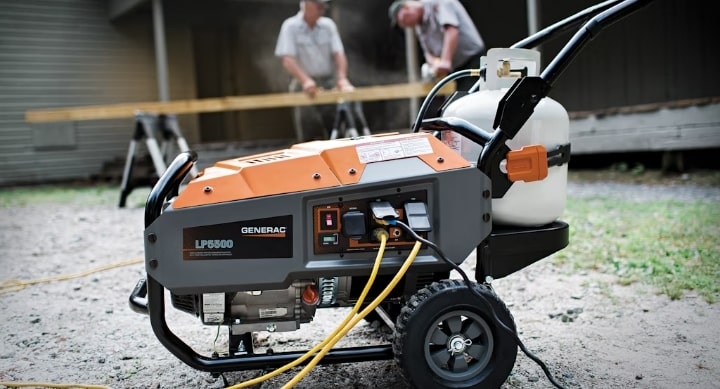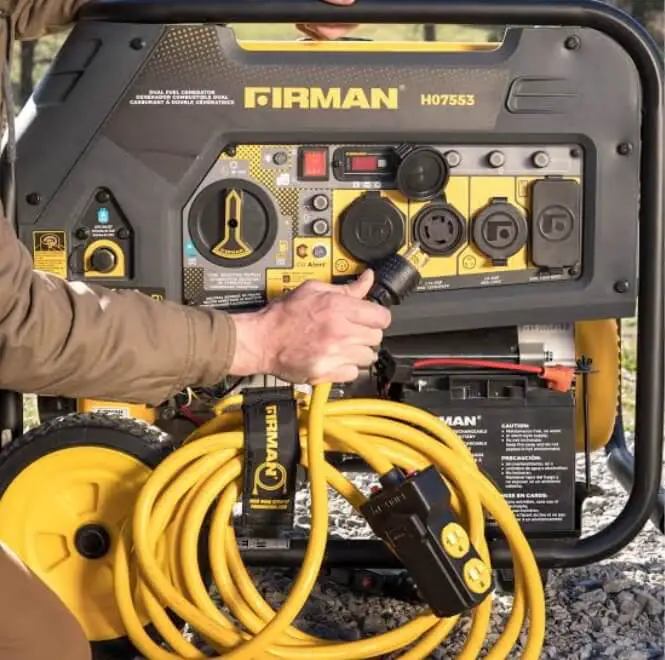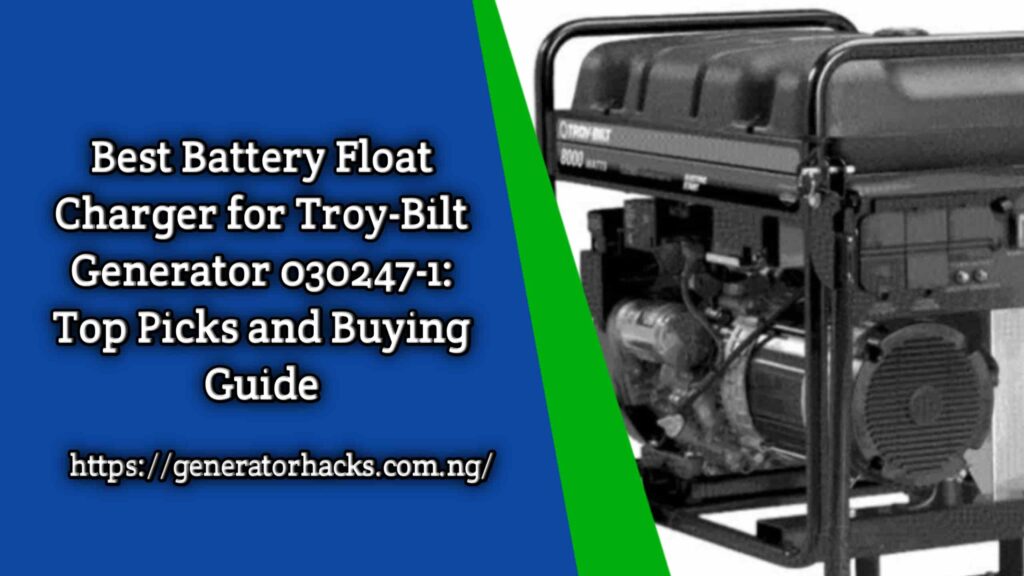As an Amazon Associate, we earn from qualifying purchases. This does not affect the price you pay or the quality of the products you buy. For more information, please read the full affiliate disclosure here.
Generators are essential devices for many homeowners and businesses, especially in areas prone to power outages or emergencies.
But buying a generator can be a daunting task, as there are many factors to consider, such as performance, type, fuel source, safety features, and price.
How can you find the best generator for your needs and budget? In this blog post, we will share some tips and tricks on how to save money on your next generator purchase in 2024.
Lets get started!
Types of Generators

The first step to buying a generator is to determine what type of generator you need.
There are four main types of generators: home standby, portable, inverter, and solar.
1. Home standby generators: These are hardwired into your home and automatically turn on when there is a power outage.
They are the most powerful and reliable type of generator, but also the most expensive and require professional installation and maintenance.
2. Portable generators: These are movable devices that can be used in any open space.
They are ideal for camping, RVing, or tailgating, as well as for powering a few essential appliances at home.
They are also less expensive than home standby generators but can power fewer items and require manual operation and refueling.
3. Inverter generators: These are a type of portable generator that adapts to the power demand placed on it by throttling up and down.
They are quieter, more fuel-efficient, and produce cleaner power than conventional portable generators, but they are also more expensive and have lower wattage output.
4. Solar generators: These are battery-powered devices that charge by plugging into an outlet or via solar panels.
They do not use propane or gas to power on and are typically lightweight and portable.
They are the most eco-friendly and low-maintenance type of generator, but they are also the least powerful and have limited run time.
Recommended Read: How to Choose An RV Generator: Buyer’s Guide
How Much Power Do You Need When Considering a Generator?

The next step to buying a generator is to figure out how much power you need. This depends on what devices you want to run and how often you plan to use the generator.
To calculate your power needs, you need to add up the starting and running watts of all the devices you want to power.
The starting watts are the amount of power needed to start a device, while the running watts are the amount of power needed to keep it running.
For example, a refrigerator may need 1200 watts to start and 200 watts to run, while a window air conditioner may need 2000 watts to start and 1500 watts to run.
You can find the wattage information on the labels or manuals of your devices, and use our online calculators to estimate it and determine the total wattage generator you should go for.
The total wattage you need will determine the size and type of generator you need. Generally, the higher the wattage, the larger and more expensive the generator.
For example, if you only need to power a few lights and a fan, you may get by with a small portable or solar generator. But if you need to power your whole house, you may need a large home standby generator.
How to Operate a Generator Safely
The third step to buying a generator is to learn how to operate it safely. Generators can be dangerous if you don’t take precautions, as they can produce carbon monoxide (CO), a deadly gas that is odorless and colorless. CO poisoning can cause headaches, dizziness, nausea, and even death.
To prevent CO poisoning, you should always use a generator outside, at least 20 feet away from your home, with the exhaust directed away from the house. You should also install working CO detectors on every level of your home and check them regularly.
That aside, new portable generators now come with a CO sensor. Additionally, you can also try to use a transfer switch when connecting a generator to your home’s electrical system.
A transfer switch is a device that switches the power source from the utility to the generator and vice versa. It prevents backfeeding, which is when electricity flows from the generator to the utility lines, creating a fire hazard and endangering utility workers.
A transfer switch also protects your generator and appliances from damage caused by power surges or fluctuations. You should hire a licensed electrician to install a transfer switch and follow the manufacturer’s instructions on how to use it.
Recommended Read: Diesel Generator vs Gasoline Generator: The Differences
Types of Generator Fuel
The fourth step to buying a generator is to choose the type of fuel you want to use. The type of fuel affects the cost, performance, and maintenance of your generator. There are three main types of fuel: gasoline, propane, and diesel.
1. Gasoline: This is the most common and widely available type of fuel for generators. It is easy to find and store, and it works well in most climates.
However, gasoline is also the most expensive and least efficient type of fuel, as it burns quickly and loses its potency over time.
Gasoline generators also require more maintenance, as they need frequent oil changes and spark plug replacements. Gasoline is also highly flammable and can pose a fire risk if stored improperly.
2. Propane: This is a cleaner and more stable type of fuel than gasoline. It produces fewer emissions and can last indefinitely without degrading.
Propane generators also require less maintenance, as they have fewer moving parts and less oil consumption.
However, propane is also more expensive and less accessi ble than gasoline, as it requires a separate tank and hose to connect to the generator. Propane generators also have lower power output and run time than gasoline generators
3. Inverter generators: These are more expensive than conventional portable generators, but they also offer some advantages, such as quiet operation, clean power, and fuel efficiency.
Inverter generators are ideal for sensitive electronics, such as laptops, TVs, or phones, as they produce stable and consistent power.
4. Solar generators: These generators can cost anywhere from $200 to $2,000, depending on the battery capacity and quality of the generator.
You may also have to pay for accessories, such as solar panels, which can add another $100 to $1,000 to the total cost.
Solar generators are the cheapest type of generator to operate, as they use free and renewable energy from the sun.
Solar generators are also the most eco-friendly and low-maintenance type of generator, as they produce no noise, emissions, or waste.
However, solar generators are also the least powerful and reliable type of generator, as they depend on the weather and daylight conditions, and have limited storage and run time.
Recommended Read: The Best Portable Battery-Powered Generator Under 300W
How to Save Money on Your Next Generator Purchase

Now that you know the basics of generators, here are some tips on how to save money on your next generator purchase:
1. Compare prices and features
Before you buy a generator, do some research online and compare the prices and features of different models and brands. You can use online tools, such as Amazon, to find the best deals and discounts on generators. You can also read customer reviews and ratings to get an idea of the quality and performance of the generator.
2. Look for sales and coupons
Another way to save money on a generator is to look for sales and coupons from retailers or manufacturers. You can check their websites, social media pages, newsletters, or flyers for any special offers or promotions on generators.
You can also use online tools, such as RetailMeNot or Coupons.com, to find and apply coupons or codes to your purchase. You may be able to save up to 50% or more on a generator by using these methods.
3. Buy a used or refurbished generator
If you don’t mind buying a second-hand or repaired generator, you can save a lot of money by buying a used or refurbished generator. You can find used or refurbished generators on online platforms, such as eBay or Craigslist, or from local sellers or dealers.
However, you should be careful and inspect the generator before you buy it, as it may have defects, damages, or missing parts. You should also check the warranty and return policy of the seller, as they may vary depending on the condition of the generator.
4. Buy the right size and type of generator
One of the most important ways to save money on a generator is to buy the right size and type of generator for your needs. Buying a generator that is too big or too small, or that uses the wrong type of fuel, can cost you more in the long run, as it will waste fuel, power, and money.
You should calculate your power needs and choose a generator that matches them, as well as consider the fuel availability, cost, and efficiency in your area. You should also buy a generator that has the features and functions that you need, and avoid paying for unnecessary or extra ones.
Final Words
Buying a generator can be a smart investment, as it can provide you with backup power, convenience, and comfort in times of need.
However, buying a generator can also be a costly decision, as there are many factors to consider, such as the type, size, fuel, safety, and price of the generator.
By following the tips and tricks in this blog post, you can save money on your next generator purchase and find the best generator for your needs and budget.
If you have any questions or comments, please feel free to leave them below.
Share

